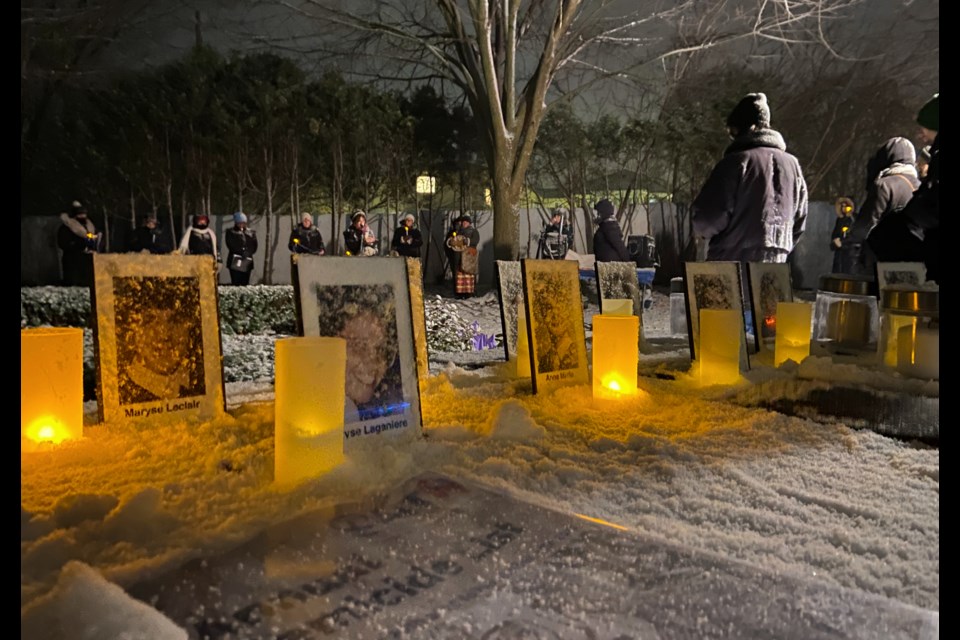Around 50 people braved the snow on Monday night to honour victims of gender-based violence.
The vigil hosted by Guelph-Wellington Women in Crisis at Marianne's Park followed a year marked by particularly high rates of femicide and coincided with the 32nd anniversary of the Montreal Massacre.
On Dec. 6, 1989 an armed gunman killed 14 women at École Polytechnique de Montréal, declaring at one point during the massacre he was "fighting feminism." The anniversary later became the National Day of Remembrance and Action on Violence Against Women.
"While it was Dec. 6 that gave femicide a name and woke the nation up that the impacts of sexism and patriarchy and misogyny are fatal," Jensen Williams, public educator at Guelph-Wellington Women in Crisis, told the crowd. "Women and girls, two-spirit folks and transgender folks continue to lose their lives each day to violence."
In addition to those slain in the Montreal Massacre, volunteers from Guelph-Wellington Women in Crisis read the names of Ontario women, girls, two-spirit people and gender non-conforming individuals who were killed by men because of the their gender in the last year.
The Ontario Association of Interval and Transition Houses compiles those numbers each year in its annual femicide list.
The 58 deaths recorded by the organization between Nov. 26, 2020 and Nov. 25, 2021 make up the longest list in 10 years, said Williams.
She explained the pandemic could be partially behind the increase.
"We know that with COVID and isolation we've seen increased barriers to survivors being able to access safe spaces, whether that be a friend or family member's house or a support organization like Guelph-Wellington Women in Crisis," Williams said.
Shelters have been operating at lowered capacities to meet public health restrictions and there's higher barriers to accessing services, for example someone living with an abuser might not be able to safely make a crisis call or attend an online appointment, they continued.
"We know the barriers are higher than ever before, so there's likely a lot of people who needed to reach out and simply couldn't," Williams said, adding there's also been more stressors for families, like job and income losses, which are known to contribute to increased violence.
Preliminary figures from the Canadian Femicide Observatory for Justice and Accountability based in Guelph show 92 women and girls were killed in Canada in the first six months of 2021, up from 78 and 60 during the same periods in 2020 and 2019 respectively.
Indigenous women and girls face even higher rates of violence and are 12 times more likely to be murdered or go missing than other women in Canada, according to Statistics Canada. A 2019 national inquiry into the issue found deliberate and persistent human rights violations and abuses committed and condoned by the Canadian state against Indigenous women, girls and 2SLBGTQ+ people amounted to genocide.
Williams emphasized Monday's vigil wasn't just about remembrance but also about taking action to end gender-based violence.
"Everyone can be a part of this work, regardless of who you are, how old you are, where you work, where you live," she said.
That could mean interrupting harmful comments or behaviours, they continued. It could also take the form of educating yourself and others about gender-based violence, creating a safety plan with someone in your life who might be at risk, and connecting people to resources if and when they're ready.
Structural change is also needed to address social inequities and the root causes of femicide, Williams said. In addition to showing solidarity with survivors and organizations tackling gender-based violence, and she encouraged the crowd to talk to their elected representatives and align themselves with grassroots movements focused on issues like harm reduction, mental health and affordable housing.
"The solutions have been brought forward and we can't just continue to listen, we need to take action," they said.
If you or someone you know is experiencing abuse, Guelph-Wellington Women in Crisis's 24-hour crisis line can be reached at 1-800-265-7233.



